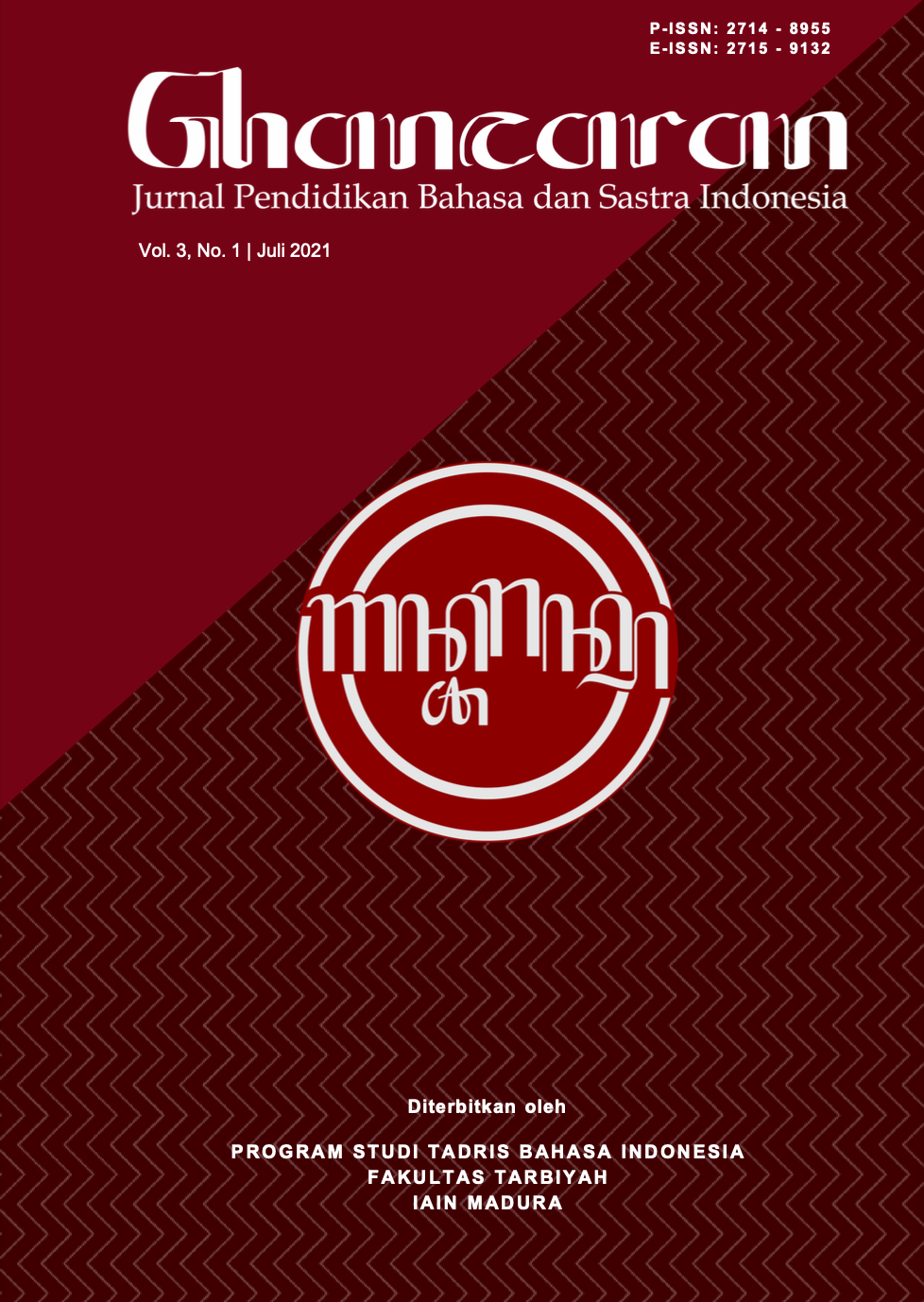Analisis Implikatur Percakapan pada Pedagang Jamu di Pasar Tradisional Prenduan, Madura
 Abstract views: 576
,
Abstract views: 576
,
 PDF downloads: 633
PDF downloads: 633
Abstract
Implicature is an implied meaning of speech that is conveyed indirectly by the speaker to the speech partner. This study aims to describe the conversational implications of herbal medicine traders in Prenduan traditional markets, Madura. This research used a pragmatic theoretical approach (implicature) and a descriptive qualitative methodological approach. The data collection technique of this study used the technique of listening, taking notes, and recording. The data analysis technique classified conversational implicatures based on the pragmatic theory approach. The results of the data analysis indicated that there were conversational implicature in the conversations of herbal medicine traders in Prenduan traditional market. Conversational implicatures are used, namely: prohibition, approval, refuse, command, request, assure, complaint, and report.
Downloads
References
Astuti, P. J., Ekawati, M., & Hapsari, T. P. R. N. (2019). Implikatur dalam Iklan Rokok di Televisi dan Implementasi Pembelajaran Bahasa Indonesia di SMP. Repetisi: Riset Pendidikan Bahasa Dan Sastra Indonesia, 2(1), 65–76.
Brutu, M. B. (2020). Analisis Implikatur dalam Iklan Komestik di Tiongkok (Kajian Pragmatik). Universitas Sumatera Utara.
Fatmawati, H. (2020). Implikatur Percakapan dalam Transaksi Jual Beli di Pasar Besar Kota Malang (Kajian Pragmatik) (Universitas Brawijaya Malang). Universitas Brawijaya Malang.
Fawziyyah, S., & Santoso, B. W. J. (2017). Seloka: Jurnal Pendidikan Bahasa dan Sastra Indonesia Implikatur Percakapan pada Iklan Kosmetik di Televisi: Kajian Pragmatik Info Artikel. Seloka: Jurnal Pendidikan Bahasa Dan Sastra Indonesia, 6(3), 323–330.
Grice, H. P. (2004). Logic and Conversation. London: University College London for Pragmatic Theory Online Course.
Hestiyana. (2016). Implikatur Percakapan Dalam Transaksi Jual Beli Di Pasar Hewan Wage Tulakan. UNDAS: Jurnal Hasil Penelitian Bahasa Dan Sastra, 12(2), 11.
Juniati, S. (2019). REALISASI TINDAK KESANTUNAN KOMISIF DI KALANGAN MASYARAKAT PEDAGANG PASAR TRADISIONAL SUNGAI PINANG DESA MEKARPURA KABUPATEN KOTABARU. CENDIKIA: Jurnal Ilmiah Pendidikan, 7(2), 41–52.
Lismayana, Rusminto, N. E., & Samhati, S. (2015). Implikatur Percakapan dalam Transaksi Jual Beli di Pasar Bumbu Kuning Bandar Lampung. Jurnal Kata (Bahasa, Sastra, Dan Pembelajaran).
Oktapiantama, H., & Utomo, A. P. Y. (2021). Analisis Tindak Tutur Direktif Pada Film Keluarga Cemara Karya Yandy Laurens. GHANCARAN: Jurnal Pendidikan Bahasa Dan Sastra Indonesia, 2(2), 76.
Pandegani, M. R., Sunarya, & Supanjari, B. (2020). Implikatur dalam Tuturan Jual Beli Pedagang Kaki Lima di Malioboro. Seminar Nasional Daring "Bahasa, Sastra, Budaya Daerah, Dan Pembelajarannya, (1), 26–27.
Putrayasa, I. B. (2014). Pragmatik (Pertama). Yogyakarta: Graha Ilmu.
Rahardi, R. K. (2005). PRAGMATIK: Kesantunan Imperatif Bahasa Indonesia (I. Syafrida & Y. Sumiharti, Eds.). Jakarta: Erlangga.
Rahayu, O., Ramli, & Bahary, R. (2016). Analisis Implikatur dalam Serial Film Eumpah Breuh. Jurnal Ilmiah Mahasiswa Jurusan PBSI, 1(4), 185–194.
Sulfiana, & Irma, C. N. (2019). Analisis Fungsi Dan Bentuk Implikatur Dalam Iklan Sprite: Kenyataan Yang Menyegarkan Di Televisi. Hasta Wiyata, 2(2), 26–32.
Suryati. (2020). Pragmatik (Cetakan I; S. Sugiastuti, Ed.). Klaten: Lakeisha.
Yule, G. (2014). Pragmatik. Yogyakarta: Pustaka Pelajar.
Yulianti, A. A. (2018). Prinsip Kerja Sama Dan Implikatur Pada Tuturan Alih Kode Dalam Film-Film Jerman. Belajar Bahasa, 3(2), 127–140. https://doi.org/10.32528/bb.v3i2.1582
Yuliantoro, A. (2020). Analisis Pragmatik (1st ed.; N. Herawati, Ed.). Klaten: UNWIDHA Press.
Ghancaran: Jurnal Pendidikan Bahasa dan Sastra Indonesia uses an Open Access Policy under the Creative Commons Attribution-ShareAlike 4.0 International License. Authors publishing in this journal agree to the following terms:
- Ghancaran Journal holds the copyright and grants the journal rights for first publication with the work simultaneously licensed under a

The work is distributed under Creative Commons Attribution-ShareAlike 4.0 International License which allows others to share, copy, and redistribute the material in any media or format and adapt, remix, change, and develop the material even for commercial purposes, as long as it is stated credit and license derivative works under similar terms. - Authors may make additional contractual arrangements for non-exclusive distribution of the journal's published work version.
- Authors are permitted to post their work online (e.g., in institutional repositories or on their websites) before and during submission, as doing so may lead to productive exchange.



















